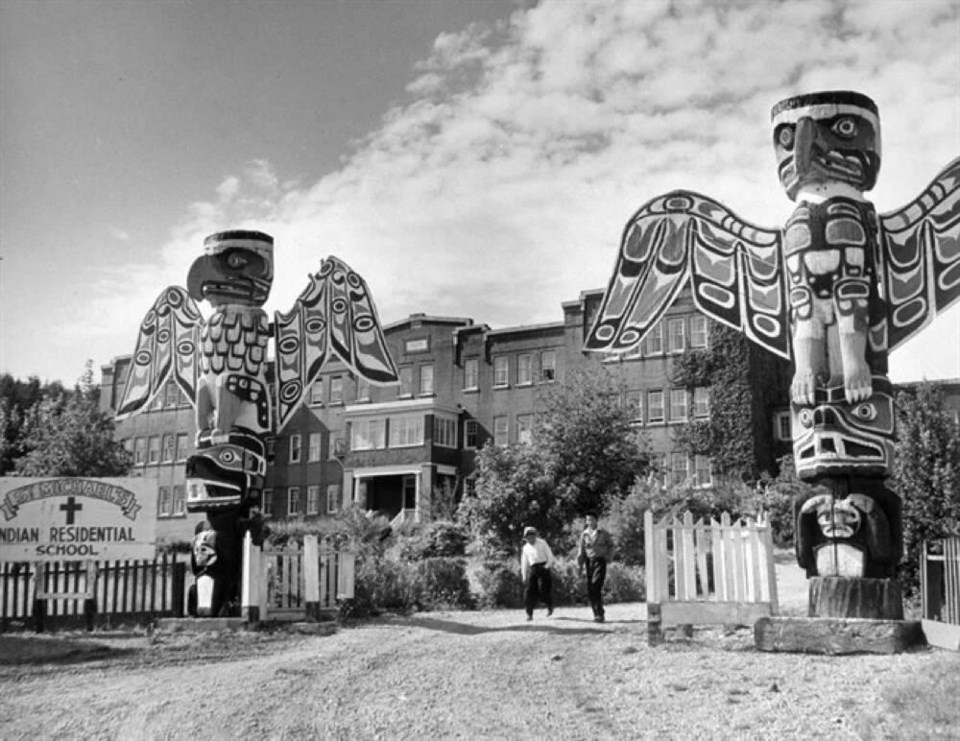Lawsuit says son born out of abuse was adopted and only recently reunited with dad, who had years ago received compensation for damages. Now both are suing the Anglican Church.

A 56-year-old adopted B.C. man who tracked down his biological father two years ago discovered he had been born as a result of sexual assault at a residential school in Alert Bay.
Now he and his father, 72, are suing the Anglican Church for damages, including for the son’s loss of knowledge of his Indigenous heritage and decades of federal benefits, according to a lawsuit in B.C. Supreme Court.
The case dates back to 1968, when the father — Postmedia is not naming the plaintiffs because of its policy of not naming victims of sexual assault — was sexually assaulted when he was 14 at St. Michael’s Indian Residential School by Jane Peacock, a church employee whose job it was to supervise the children, according to the lawsuit.
He sued the church in 2006 for sexual assault and the case was settled in 2008, it said.
He didn’t find out until 2023 that he fathered a son by Peacock, a child she gave up for adoption to a non-Indigenous family, the lawsuit said.
His son found him and “this reunion was traumatic for both” because the father had no idea he had a son, “who was taken away from him, his own family, his own community and his heritage,” it said.
The loss of his biological son was a “further psychological trauma” for him, and meeting his son reopened the trauma from the sexual assault, it said.
The son learned that he was “born from the rape of his father and that his mother was the perpetrator,” a revelation that compounded the “trauma from being adopted by a non-Indian family,” said the lawsuit.
The two men approached the church this year to “see what steps would be taken to assist them with their traumas and to offer them compensation,” it said.
The church said the settlement signed by the father in 2008 “completely absolved the defendants of any liability,” according to the lawsuit.
The men said they filed the lawsuit to “seek closure and healing.”
Besides the Anglican Church, the attorney general of Canada is named as a defendant because the school was “jointly developed and implemented” by both, it said.
The father, who attended St. Michael’s from 1963 to 1968, is an elder and member of a First Nation in B.C., which his son has also recently joined, according to the lawsuit.
But the son was unable to register as a status Indian before now because the defendants did not disclose to him that his biological father was a status Indian, and he therefore lost “significant benefits,” including income and excise tax exemptions, housing, health and education benefits and band payments, it said.
He lost the chance to learn his language and his culture, a “significant personal loss,” said the lawsuit.
The Anglican Church between 1929 and 1975 operated St. Michael’s on behalf of the federal government, it said.
“Ms. Peacock breached her fiduciary duties by sexually assaulting the [father] by forcing him to have sexual intercourse with her while he was only 14 years old,” it said.
The case was settled out of court, and the father signed the settlement, it said.
But he didn’t know he had fathered a son, so the settlement doesn’t preclude him from suing the church in this case, the lawsuit argues.
After the release of the Truth and Reconciliation Report in 2015, the Anglican Church and the federal government recommitted to advancing reconciliation for victims.
“Despite these repeated promises to advance reconciliation, the defendants have refused to address the harms, damages and claims of the plaintiffs,” the lawsuit said.
It said that as the result of the sexual assault, both men have sustained psychological and emotional injuries and damages, including PTSD, depression and suicidal thoughts, anxiety, feelings of guilt, self-blame, shame, fear and loneliness, loss of self-esteem and self-worth, diminished ability to trust and form intimate and familial relationships or to deal with social interactions.
They’re seeking undisclosed damages, including punitive, exemplary and aggravated damages, it said.
Messages left with the Anglican Church weren’t immediately returned. The plaintiffs’ lawyer also did not return a message.